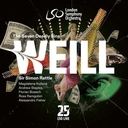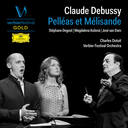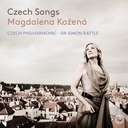Redaktorka portálu Presto Classical Katherine Cooper rozmlouvala s Magdalenou několik dní poté, co se pěvkyně představila v ravelovském programu na londýnských Proms. Rozhovor o francouzské písňové tvorbě, o Magdalenině spolupráci se dvěma nejvýznačnějšími berlínskými symfonickými orchestry a také o dvojici francouzských alb, které spolu s Robinem Ticciatim Magdalena natočila pro label Linn Records.
Magdalena Kožená on French song
Katherine Cooper, Presto Classical 20/09/2018
The Czech mezzo Magdalena Kožená made her name as a superb interpreter of baroque music and Mozart, but nineteenth- and twentieth-century French repertoire has been close to her heart since the early stages of her career; her 2003 album of French operatic arias remains a huge favourite of mine, and her recording of Ravel’s Shéhérazade with her husband Sir Simon Rattle and the Berliner Philharmoniker ten years later was shortlisted for a Gramophone Award.
Last autumn she joined the Deutsches Symphonie-Orchester Berlin and their new music director Robin Ticciati on their debut recording of Debussy (singing the Ariettes oubliées in evocative new orchestrations by Australian composer Brett Dean); tomorrow sees the release of an equally captivating sequel, Aimer et mourir, with Kožená singing five of Duparc’s best-known mélodies alongside performances of Ravel’s second Daphnis et Chloé suite and the Valses nobles et sentimentales. I spoke to Magdalena a few days after her Proms performance of Shéhérazade, touching on the challenges of singing Duparc in these orchestrated versions, her relationships with the two Berlin orchestras, and whether more dramatic French repertoire might figure in her future…
You recently performed Ravel's Shéhérazade and L'enfant et les sortilèges at the BBC Proms, and two of his orchestral works feature alongside the Duparc songs on this new album - how different are the two composers in terms of their vocal writing?
Even though it’s all French music, of course, it’s really quite different - Ravel is extremely careful and delicate in the way he thinks about relationship between the voice and instruments, whereas Duparc was heading in a more Wagnerian direction. I’ve sung these arrangements in concert, but I found doing the recording a little bit easier in a sense, because you don’t have to struggle so much with the very heavy orchestration. Even though Duparc arranged some of them himself, he originally conceived these songs for voice and piano, and when he orchestrated them they became a good bit more dramatic. In terms of how you use your voice (especially in these orchestral versions), you really do have to approach Duparc as a Romantic composer who needs plenty of sound, and you also need to bear in mind that melodies are generally more important than the text, which is pretty much the exact opposite of Ravel! In Shéhérazade, for instance, the rhythm of the text follows the French intonation of the language as it is spoken: he sets it exactly as you would actually speak it, and that’s what I really love about singing his music. I was joking the other day about the fact that when I’m doing opera I almost prefer the recitatives to arias, because I like to tell the story rather than just producing beautiful sounds - though ideally you’ll be doing that as well!
Do you find that you make different interpretative choices when you’re performing these songs with an orchestra as opposed to in the original piano versions?
I try to approach things in the same way, but when you’re singing these pieces with a big orchestra you do need to compromise a little bit: you have to do whatever’s needed, because there’s no point in producing a beautiful pianissimo colour if nobody can hear you! But on the other hand, the orchestra itself usually adds much more colour than a piano, and you can take your cue from that – for instance, when you sing with a flute, you can allow a little more air into your voice to match the timbre of the instrument, and I love to play with things like that. I sang in a choir for my entire childhood, and that left a huge impression on me in that I always like to adjust to the bigger picture. I would never want to be the kind of singer who rolls up and says ‘Here am I: please accompany me!’: I like to listen and attune to what each instrument’s doing, and also to see what these particular players are bringing to the table. Every time you do a piece with a new conductor and orchestra or ensemble, it’s that little bit different, and I’m always open to spontaneous decisions! Of course I have a general idea of what I want to do, but some players can surprise and inspire you with a beautiful phrase shaped in a different way, and you think ‘Oh, maybe I could copy that!’. That’s when the music really becomes alive – I can’t imagine just preparing a score on my own in a practice-room and then thinking ‘This is how I sing it, job done!’.
Celý rozhovor je k dispozici zde:



